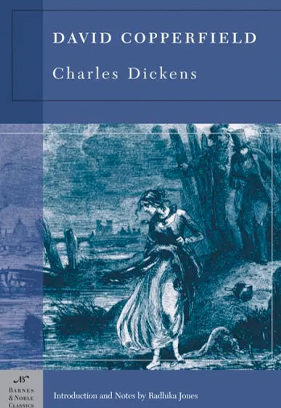Characters in David Copperfield rarely use profanity. One says the word, “d–ned” and another uses “a–.” Characters employ creative insults such as calling characters “hound,” “goblin,” prog” and “polly” (which is slang for “sissy”). There are several uses of the word, “stupid,” and we also hear exclamations such as, “In the name of Heaven.” Characters use “Lord” as an exclamation, and some say phrases like “God knows,” “My God” and misuse the word Christ. We also hear some uses of “what the devil” or “go to the devil.” Davey observes that his schoolmates are dancing “like wild Indians,” and he refers to a little person as a “dwarf.”
Many characters in David Copperfield die, including a newborn infant and women. Sometimes, characters see the bodies of their dead relatives, but descriptions are never gruesome. While most deaths are of natural causes or sickness, there is a scene in which two characters die in a shipwreck, leaving some covered in blood.
The novel also covers a great deal of childhood trauma. Mr. Murdstone “boxes” Davey’s ears and beats him mercilessly. When Davey retaliates by biting him, Mr. Murdstone locks him in his room for five days. Mr. Creakle, the headmaster at Salem house, is known for beating his students with a cane, and he consistently abuses Davey and the other students. Davey even hears rumors that Mr. Creakle broke the ribs of a young student. While Davey is on the run from London, a man robs him and threatens to rip his body open.
Miss Betsey hits and yells at the boys who attempt to trespass on her yard, and to punish her dog for bad behavior, Dora puts his nose on a hot tea pot. Steerforth tells Davey that when he was a child, he got mad at a woman and threw a hammer at her. There is also a scene in which a man hits a woman (drawing blood) and pushes her to the ground.
Davey gets in a physical fight with a man who gives him puffy eyes. Later, Davey fights this man again and knocks out his teeth. Some characters have a conversation about blood, and a woman threatens someone and calls her a “purchased slave.”
Annoyed with a clerk named Uriah Heep, David imagines throwing him over a banister and stabbing him with a hot poker. In one chapter, a woman slaps Steerforth, and in another, Davey slaps another man.
Adults and children alike drink alcohol. At Salem House, for example, Steerforth purchases wine to share with the other school aged children, and Davey drinks beer as a child. Miss Betsey’s nighttime routine includes a glass of wine. Several characters get drunk, including Davey, and a character has a serious drinking problem. When Miss Betsey adopts Davey, Miss Murdstone asserts that she must be intoxicated to make such a decision.
Several characters smoke, including Mr. Murdstone (who Davey observes “smoked incessantly”). Davey attempts to smoke a cigar, too. Characters discuss a person who had died of excessive alcohol and smoking.











